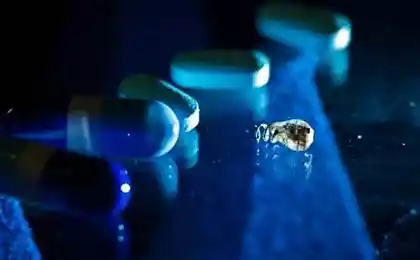370
Post-traumatic stress disorder
Eighty million one hundred thirty seven thousand six hundred eleven
Veterans of armed conflicts who have seen enough death and destruction, civilians, survivors of natural disasters, rape victims, police and prostitutes — all of them often suffer from post-traumatic stress disorder (PTSD). It is a heavy state of mind has many characteristic of a society: in the United States is "Vietnam syndrome" in Russia — "the Chechen" in both countries, "Afghan".
The invisible psychological wounds that remain after a traumatic event are the reasons of panic and depression, Intrusive memories and nightmares. Even if therapy with the use of antidepressants this disorder is pretty bad curable. Especially if the diagnosis is wrong or not quite right. Or drug appointed not the same.
Now scientists from the medical complex "mount Sinai", which is located in new York, found in human blood biomarker, the appearance of which is associated with PTSD. That gives you the opportunity to continue developing unique test for post-traumatic stress disorder, which, judging by events in the world of the second decade of the 21st century, still some time will be in high demand — including places in the world called hot spots.
In a series of experiments on rats, scientists have identified changes in the brain in animals, a gene that regulates production of the stress hormone, after rodents for 10 minutes frightened cat feces. The fact that cats are natural enemies of rats, so these animals feel fear and anxiety at the smell of cats.
After the test rodents the scent of a predator they, as usual, ran into the maze, where rats demonstrated a fair amount of anxiety. In addition, they began to flinch at any loud noise.
However, some of the cat shit scared of rats an hour after the shocking impact of the injected portion of the stress hormone corticosterone. A week later after the experience with terrible smells jabbed hormone animals showed much lower levels of arousal and anxiety than the control fellow stress.
The neurologist from "mount Sinai" Nicholas Daskalakis noted that his Swiss colleagues once tried to treat corticosterone of survivors of a car accident. And they turned out well — the hormone, which was given to the victim stress in the brain after the injection of the externally operated on patients soothingly, i.e., subsequently they did not develop the symptoms of such disorders as PTSD.

Analysis method stress syndrome, developed by Daskalakis, involves the measurement of blood activity of glucocorticoid receptor, which is connected to a molecule of the stress hormone that leads to peace. Some people and animals, the genes governing the production of the hormone thereof, violated, and therefore, they are at risk for PTSD.
Dr. Daskalakis notes that post-traumatic stress disorder affects not only the brain but the whole organism that is particularly sensitive to stress factors, which plunges the patient into experiences again and again.
Veterans of armed conflicts who have seen enough death and destruction, civilians, survivors of natural disasters, rape victims, police and prostitutes — all of them often suffer from post-traumatic stress disorder (PTSD). It is a heavy state of mind has many characteristic of a society: in the United States is "Vietnam syndrome" in Russia — "the Chechen" in both countries, "Afghan".
The invisible psychological wounds that remain after a traumatic event are the reasons of panic and depression, Intrusive memories and nightmares. Even if therapy with the use of antidepressants this disorder is pretty bad curable. Especially if the diagnosis is wrong or not quite right. Or drug appointed not the same.
Now scientists from the medical complex "mount Sinai", which is located in new York, found in human blood biomarker, the appearance of which is associated with PTSD. That gives you the opportunity to continue developing unique test for post-traumatic stress disorder, which, judging by events in the world of the second decade of the 21st century, still some time will be in high demand — including places in the world called hot spots.
In a series of experiments on rats, scientists have identified changes in the brain in animals, a gene that regulates production of the stress hormone, after rodents for 10 minutes frightened cat feces. The fact that cats are natural enemies of rats, so these animals feel fear and anxiety at the smell of cats.
After the test rodents the scent of a predator they, as usual, ran into the maze, where rats demonstrated a fair amount of anxiety. In addition, they began to flinch at any loud noise.
However, some of the cat shit scared of rats an hour after the shocking impact of the injected portion of the stress hormone corticosterone. A week later after the experience with terrible smells jabbed hormone animals showed much lower levels of arousal and anxiety than the control fellow stress.
The neurologist from "mount Sinai" Nicholas Daskalakis noted that his Swiss colleagues once tried to treat corticosterone of survivors of a car accident. And they turned out well — the hormone, which was given to the victim stress in the brain after the injection of the externally operated on patients soothingly, i.e., subsequently they did not develop the symptoms of such disorders as PTSD.

Analysis method stress syndrome, developed by Daskalakis, involves the measurement of blood activity of glucocorticoid receptor, which is connected to a molecule of the stress hormone that leads to peace. Some people and animals, the genes governing the production of the hormone thereof, violated, and therefore, they are at risk for PTSD.
Dr. Daskalakis notes that post-traumatic stress disorder affects not only the brain but the whole organism that is particularly sensitive to stress factors, which plunges the patient into experiences again and again.























